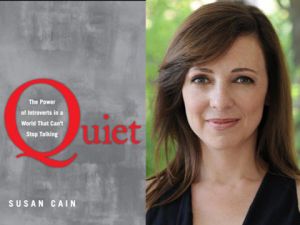Susan Cain is a Harvard educated lawyer and well-regarded public speaker on the topic of introversion and leadership. She also once needed a water bottle filled with Bailey’s Irish Cream in order to calm her nerves before a big presentation, so clearly she is a woman who draws inspiration from personal experience.
Cain’s book “Quiet: The Power of Introverts in a World That Can’t Stop Talking” draws from anecdotes like Cain’s and scores of academic research to demonstrate the benefits of introverted personality traits (putting listening before talking, solitary working, aversion to risk, non verbal communication) in a society that values team working, extemporaneous speaking and “putting yourself out there” as keys to personal and professional success, or even happiness. Has American culture valued extroversion at the expense of less demonstrative forms of leadership and expression? Cain believes there’s some truth to this, and that the rise of industrial age and growing influence mass media and advertising may indeed have played a role in creating a Extrovert Ideal in U.S. culture starting in the early 20th century.
“Americans found them working no longer with neighbors but strangers. ‘Citizens’ morphed into ’employees,’ facing the question of how to make a good impression on people to whom they had no civic or family ties. […] Americans responded to these pressures by trying to become salesmen who could sell not only their company’s latest gizmo but also themselves.”
None of these developments are negative per se, but what of the leaders, the employees who lack a traditional sense of charisma and avoid the spotlight but excel in other forms of strength and leadership (reflectiveness, caution, etc.) Why are quieter forms of leadership and creativity seen as signs as liabilities in the corporate world? Why is Apple’s Steve Jobs popularly portrayed as an brash innovator but co-founder Steve Wozniak portrayed as a mealymouthed eccentric? (Not that there’s no truth to this, but …)
Cain references a number of leaders and innovators in technology and social media who are self =-professed introverts: Guy Kawasaki, Craigslist’s Craig Newmark, Google’s Larry Page, even Mashable’s Pete Cashmore. It isn’t really surprising, Cain herself mentions that the Open Source community was built by solitary collaboration, those “geeks in the basement” who shared code and ideas with each other from around the world. Though these days it’s hard to believe, there was once a point where blogging was considered a solitary activity (again with “geeks in the basement”) focused far more on the process of writing than promotion of it.
As an embrace of Extrovert Ideal seeps into the online world, many of the elements that made online culture what it is being eroded. We *are* losing something special in the age of personal brand building, even if we don’t recognize it. Google and Craigslist weren’t born from the dynamic personalities of their founders but from ideas that were allowed to grow from small- scale online collaboration that scaled up. Millions of readers know Mashable by name but not necessarily Pete Cashmore. But as flashy conference presentations and mile-a-minute brainstorming meetings become the norm in the tech/social media space, I fear the slow burn contributions of introverts won’t have a chance to flourish in the way they did.
For the past six years, I’ve spent my career extolling the virtues of sharing, connecting, and expressing creativity online. I do presentations and conferences often, being a peppy cheerleader for Google Analytics or blogging other geeky online topics. I truly enjoy it, but if you had told me years ago that I’d be doing any of it, I would have quietly laughed at you and returned to writing my blog. Despite what I choose to do for a living and how I spend much of my free time, I live in my own head a lot.
Many of us do, and that’s far from a defect, Cain notes. It can be a strength. Cain devotes a couple of chapters on strategies to help introverts assert themselves in environments (particularly corporate) where being chatty is essentially a requirement. Some of them include finding restorative niches – physical and emotional pit stops- to reflect and recharge; choosing specific personal goals and projects as the moments to stretch one’s “extroverted muscle” and adopting positive facial and body language to disarm and relax in stressful public situations. Also, check out this article from Cain and Guy Kawaski about charisma for intoverts.
Particularly for those pressured to promote in the once introvert-friendly online world, many of Cain’s strategies are lifesavers (though some are easier to execute than others, depending on your work or life situation.)
For me, personally, Quiet not only gave me more insight into my own personality (why public events exhaust me more than going for a long run, or how I chose to interact growing up in a family with two dominant extroverts) Mostly it called attention to some elements of my own personality that I distanced myself from in the past few years my need for solitude, time to work on ideas independently, not talking for an entire day.) Rather than always overcompensating for introversion, Quiet says claiming one’s introversion could indeed be the best thing you can do for yourself personally and professionally.


